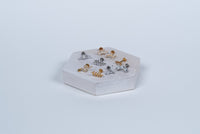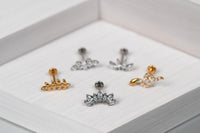When you're running a piercing studio, the quality of your jewellery directly impacts your clients' healing experience and your professional reputation. Implant-grade titanium stands out as the gold standard for both initial and healed piercings because it offers unmatched biocompatibility, meets strict EU safety requirements, and provides superior performance compared to alternatives like surgical steel.

Meeting EU Safety Standards Made Simple
The European market has some of the strictest regulations for body jewellery, particularly around nickel release. Under the EU Nickel Directive and REACH regulations, jewellery that contacts the body must release less than 0.2 µg of nickel per cm² per week. This is where implant-grade titanium truly shines.
Unlike surgical steel, which contains 10-13% nickel, implant-grade titanium alloys (ASTM F-136 and F-67) contain less than 0.05% nickel and consistently test well below detection limits in EN 1811 assays. This means you can confidently offer these pieces to even your most sensitive clients without worry about allergic reactions or compliance issues.
Health Benefits Your Clients Will Notice
The numbers speak for themselves: while nickel hypersensitivity affects 10-15% of EU adults, confirmed titanium allergies occur in less than 1% of the population. This dramatic difference translates to fewer healing complications, reduced inflammation, and happier clients who recommend your studio to others.
Implant-grade titanium forms a stable titanium dioxide layer that actually promotes tissue integration rather than fighting against it. Many experienced piercers report that clients switching from surgical steel to titanium jewellery see faster healing times and fewer irritation bumps, particularly with challenging cartilage piercings.
Performance That Justifies the Investment
Beyond safety, titanium offers practical advantages that benefit both you and your clients. Its strength-to-weight ratio is twice that of surgical steel, allowing for thinner posts and lighter jewellery without sacrificing durability. This is particularly valuable for larger pieces like belly button rings or multiple piercings where weight becomes a comfort factor.
The material's exceptional corrosion resistance means pieces maintain their appearance and integrity even in the challenging environment of healing tissue. Unlike some alternatives, titanium can withstand repeated autoclave sterilisation cycles without dimensional changes or surface degradation.
What to Look For When Sourcing Titanium Jewellery
Not all titanium jewellery is created equal. When evaluating suppliers, insist on documentation that includes mill certificates showing ASTM F-136 or F-67 grade compliance, EN 1811 nickel-release test reports, and surface finish specifications (aim for Ra ≤ 0.025 µm mirror finish).
Be wary of suppliers offering vague "titanium" without specific grade information. Consumer-grade titanium lacks the rigorous testing and composition control of implant-grade materials. Quality suppliers will readily provide comprehensive documentation and understand why these certifications matter for your business.
Pay attention to threading systems as well. Internally-threaded or threadless designs reduce tissue trauma during insertion and are increasingly preferred by professional piercers. Popular options include titanium labret studs and clicker rings. The threading quality often reflects the overall manufacturing standards of the supplier.

Making the Right Choice for Your Studio
Choosing implant-grade titanium isn't just about following trends – it's about providing the safest, most comfortable experience for your clients while protecting your business from potential compliance issues. The initial investment in higher-quality jewellery pays dividends through reduced complications, positive client experiences, and the professional reputation that comes with using industry-leading materials.
Whether you're stocking basic titanium balls for simple jewellery changes or premium nipple rings for specialized piercings, implant-grade titanium ensures you're offering the best possible foundation for successful healing.
Frequently Asked Questions
What's the difference between implant-grade titanium and surgical steel?
Implant-grade titanium contains virtually no nickel (under 0.05%) while surgical steel has 10-13% nickel. This makes titanium much safer for sensitive clients and EU compliant without question.
Is implant-grade titanium worth the extra cost?
Yes, because it reduces healing complications, satisfies even sensitive clients, meets strict EU regulations automatically, and maintains its appearance longer than cheaper alternatives.
How can I verify if titanium jewellery is actually implant-grade?
Ask suppliers for ASTM F-136 or F-67 mill certificates, EN 1811 nickel-release test reports, and surface finish specs. Legitimate suppliers provide this documentation readily.
Can titanium jewellery be anodised safely?
Yes, voltage anodising creates stable oxide layers that don't affect biocompatibility or nickel release. Just ensure proper cleaning instructions are followed for coloured pieces.
What should I tell clients about titanium vs other materials?
Explain that implant-grade titanium has the lowest allergy risk, heals faster, and is the same material used in medical implants. It's the safest choice for initial piercings.

ASTM F136 Titanium Piercing Jewelry Care Guide for Studios: Complete Maintenance Instructions<
ASTM F136 titanium jewelry requires simple maintenance: clean with mild soap and water, use ...

Titanium Labrets: The Ultimate Guide for Safe Piercing Jewelry
Titanium labrets are the gold standard for safe piercing jewelry. They offer excellent biocompatibil...

